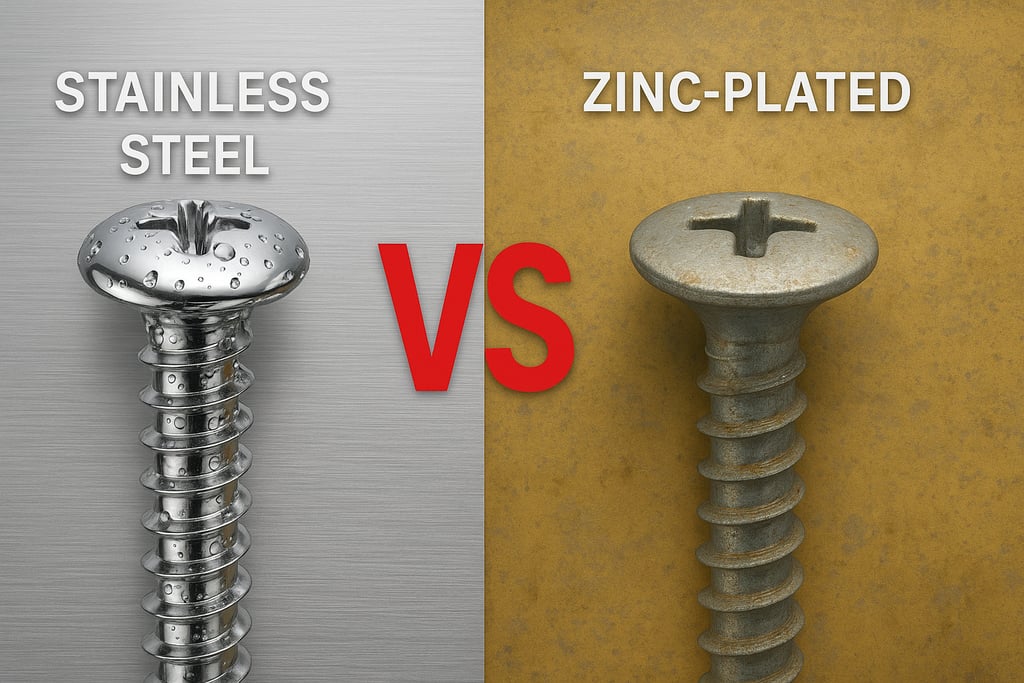Stainless Steel vs Zinc-Plated Screws | Corrosion Resistance
Compare stainless steel and zinc-plated screws to see which offers better corrosion resistance for industrial, marine, and construction applications.


Stainless Steel vs Zinc-Plated Screws: Which Offers Better Corrosion Resistance?
By Bait Alnuhas | Your Trusted Fasteners Partner
In fastener selection, one decision can directly influence the long-term strength and safety of your project: choosing the right ***** material and coating. Among the most common options, stainless steel and zinc-plated steel stand out — but they perform very differently when it comes to corrosion resistance.
In this blog, we'll break down how they differ, which environments they're best for, and how to make the smartest choice for your application.
1. Understanding the Materials
Stainless Steel Screws
Made from steel alloyed with chromium (usually 10.5%+)
The chromium forms a self-healing passive layer that prevents rust
Grades like A2 (304) and A4 (316) offer high corrosion resistance
Non-magnetic (in most cases) and ideal for outdoor, marine, and industrial environments
Zinc-Plated Steel Screws
Standard carbon steel screws coated in a thin layer of zinc
Zinc provides sacrificial protection — it corrodes first, protecting the steel beneath
The coating is usually 8–12 microns thick
Ideal for indoor or dry environments where moisture exposure is minimal
2. Corrosion Resistance: Head-to-Head
PropertyStainless SteelZinc-Plated SteelRust ResistanceExcellent — long-term protectionModerate — short-term barrierMoisture / Humidity ToleranceHighLow to MediumSalt/Marine ExposureVery High (especially 316 grade)Not RecommendedService Life25+ years1–5 years (depending on conditions)
Bottom line: Stainless steel screws outperform zinc-plated screws significantly when exposed to moisture, humidity, salt, or chemicals. Zinc-plated screws may rust quickly if the protective coating is scratched or worn away.
3. Cost vs Performance
Zinc-Plated Screws
Cheaper upfront, suitable for temporary or indoor applications like furniture assembly, drywall, or light electrical fixtures.
Stainless Steel Screws
Cost more initially but deliver long-term durability, minimal maintenance, and reduced replacement costs.
Long-Term Value
When factoring in replacement, downtime, and corrosion-related failures, stainless steel often proves more cost-effective.
4. Choosing the Right ***** for Your Project
Ask these key questions before choosing:
Moisture Exposure
Will the ***** be exposed to moisture, humidity, or salt air? → Choose stainless steel.
Indoor Applications
Is the application purely indoor, dry, and short-term? → Zinc-plated is acceptable.
Strength & Aesthetics
Is strength or aesthetics important? → Stainless steel offers both.
Budget Considerations
Is initial cost your primary concern? → Zinc-plated can reduce upfront spend.
5. Why Contractors Trust Bait Alnuhas
At Bait Alnuhas, we supply a comprehensive range of stainless steel (A2, A4) and zinc-plated fasteners built to international standards (DIN, ISO, ASTM).
Precision Engineering
Precision-engineered fasteners with consistent quality
Bulk Quantities
Bulk quantities available for large projects
Export Ready
Export-ready packaging and documentation
Expert Support
Technical support from our fasteners specialists
Whether you're sourcing for marine infrastructure, outdoor steel structures, or industrial machinery, our team helps you select the right material for maximum durability and performance.
Final Verdict
If your priority is corrosion resistance and long-term reliability, stainless steel screws are the superior choice. If your project is indoor, short-term, or cost-driven, zinc-plated screws can be a practical alternative.
The right decision depends on your environment, lifespan expectations, and performance requirements — and that's where Bait Alnuhas can guide you.
Need Expert Help Selecting the Right Screws?
Contact Bait Alnuhas today for premium stainless steel and zinc-plated fasteners at competitive prices. Let's build with strength, trust, and corrosion-free performance.
